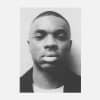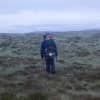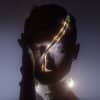For Koreless, things are about to get serious. Having turned 21 and graduated from university just weeks ago, Koreless—born Robert Lewis—can finally pour all his energies into making music. This is a very good thing, because it feels like the Welsh electronicist has been only drip-feeding fans since 2009, when "Up Down Up Down" was released, inaugurating his sound of bass-anchored, darkly melodic soundscapes with occasional two-step kicks. A self-described musical late bloomer, he credits moving to Glasgow to study as the tipping point. Where his hometown of Bangor was awash with dub reggae, his adopted Scottish city fed Koreless a diet of house and techno, and he started rolling with Hudson Mowhawke, Rustie, Jackmaster and the sprawling LuckyMe/Numbers record label axis. “There’s this bar called the Ivy Bar and basically we all live there. You can always go in and see someone from Numbers or LuckyMe. It’s really nice and it’s so small everyone knows everyone.”
As for his own music, what started off as Burial-indebted bedroom compositions matured into something much more with his primary aim for his songs to evoke an emotion, an emotion which he admits is often inspired of a sinister or gloomy bent. Remixes for Jacques Greene and Ghostpoet followed, his debut single proper—“4D/MT1”—was released in March 2011 and “Lost in Tokyo” emerged on Jamie XX’s much-shared Essential Mix last August. Only now is that last mellow, synth-rippled tune getting a proper release, via Vase, on July 16th. Have a listen here and read my interview below.
Stream: Koreless, "Lost in Tokyo"
So it was your birthday recently and you played a festival in Croatia. Did anyone in the crowd bring you cake? No, I didn’t get any cake. I was gutted, but I did play as the sun came up on the beach at about 5AM and that was really cool.
Your output thus far has been pretty sporadic. Is this because of the period of writer’s block you went through? What happened? After that first release came out [“4D/MTI”] I was playing shows like twice a week which means that’s pretty much four days written off, and I was trying to finish uni, which was a bit of a drag. Also I made those tracks a long time before they came out so when they eventually did, I didn’t want to do that sort of 808 dance music at all. Basically, I spent a year in the studio, wrote four EPs and scrapped them all. I was just writing and writing and writing. With this upcoming EP [title and release date yet to be confirmed] I’ve figured out my general direction and I’m all ready to go.
Your move to Glasgow seems to have been fundamental to your musical development, but I heard somewhere you were planning to move to London? I was toying with the idea, but Glasgow’s got such a healthy scene. Because it’s separated from London everyone’s more into doing their own thing. You don’t work with people as much, but you’re forced to figure things out yourself a bit more. It’s a healthy place to make music.
I went to the silent disco you played at the Tate Modern a few months back for the Infinite Kusama exhibition and it was a pretty bizarre environment for a set. How was the experience for you? That was cool, and Actress being there and playing too was nuts. I really enjoyed it, but the silent disco part was really strange. Halfway through I took my headphones off and it was totally silent, but people were just bopping around. It was the weirdest thing I’ve ever done.
You played a snippet of "My Favourite Things" at the beginning of the set. Am I to assume you’re a massive fan of the Von Trapp family? No, actually! Have you seen the Lars Von Trier film Dancer in the Dark? Bjork’s in it and she sings it at the end as she’s going off to get executed and it’s just so haunting. So for me it has quite a different meaning, but I realize anyone that hasn’t see the film is just going to think The Sound of Music. When I hear it, it sounds really dark.
I’m intrigued as to how you ended up studying naval architecture at university… I wanted to do architecture since forever and I started to do a lot of sailing stuff and I thought, “Oh I’ve got a great idea, I’m going to merge sailing and architecture and do naval architecture.” It’s cool, but it’s nothing like architecture really. Bit of a cock up!
So what is it, the architecture of boats? Well that’s what I thought it would be, a lot more about the curves of the boats but it’s really just about how water works, like the science of water. It’s much more of a science thing as opposed to an architecture thing. Nevermind!
If your upcoming EP was the soundtrack to a (short) movie what kind of movie would it be? You know Prometheus? Musically it was pretty balls, but “Sun”—the second track on my EP—is this huge, building epic that would work quite well in some weird sci-fi with a massive spaceship coming down to earth.
Who would be your dream collaboration? I think Actress is incredible. He’s one of the only producers where I’ll listen to his album and wonder how he did that. It’s real out-of-the-box thinking, so I wouldn’t mind sitting down with him. Generally, I don’t really like working with people, but I worked well with Sampha [on "Let It Go"]. We did a couple of tracks that never saw the light of day and we’re going to release them before the end of the year on Young Turks under the name Short Stories. Hopefully I’ll get to do more stuff with him. He’s just so clever, lyrically and production-wise as well.
What influences your music beyond other artists? I like my music to be laid out so I can see everything, so I’m quite influenced by shapes and the way it all looks on the screen. I like trying to get a bit of maths in it, I like patterns in music and making things work in interesting ways and having them react and go off on their own little tangent.


